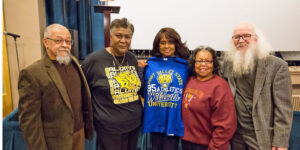HBCUs and Albion: Teachers’ Personal Stories Cap Black History Month
Related Posts
Connect With Us
March 1, 2018

Retired Albion Public Schools history teacher Bob Wall (left) and Albion College history professor Wes Dick (right) with HBCU alumnae Hazel Lias (retired physical education teacher), Vivian Davis (retired Albion High School counselor) and Barbara Davis (retired Harrington Elementary fourth-grade teacher) at the February 27 program at the Bohm Theatre.
Jake Weber
Personal histories of some beloved Albion educators merged with a national documentary earlier this week in a community-centered conclusion to Albion College’s 2018 Black History Month celebration. On February 27, Tell Them We Are Rising, a film about historically black colleges and universities (HBCUs), was shown at the downtown Bohm Theatre; it was followed by a “talk back” from three local HBCU alumni and Albion Public Schools educators.
College professor of history Wesley Dick noted that Vivian Davis, Barbara Davis (no relation) and Hazel Lias were among many African Americans, most from HBCUs, who were recruited to increase Albion’s teacher diversity in the 1960s. Following the desegregation of its schools in the 1950s, Albion recruited African American teachers from across the South, many of whom continue to be community leaders today.
Fort Valley State
As a first-year student at Fort Valley State College in Georgia, Vivian Davis recalled that the school closed so that its students could march in a funeral procession for Rev. Martin Luther King, Jr. “As we were marching very peacefully, there were people sitting on second stories with guns pointed at the students,” she said. “Of course, that shook me to the core.”
In the face of such social threat, Vivian noted that in some ways, HBCUs provided a safe and accepting environment for parents as much as students. Like her co-presenters, Vivian was a first-generation college student. “My parents didn’t know what college even was,” she said. “They sent me where they thought I would be protected.”
Grambling State
Barbara Davis, who grew up in New Orleans’ Lower Ninth ward, was a hallmate at Grambling State University with Albion College trustee Mae Ola Dunklin (also a former Albion educator, unable to attend this event). “We experienced unrest on campus; we went to some sit-ins,” Davis said, recalling one night when the National Guard closed off the only entrance to the campus. “That was terrifying,” she said.
King’s assassination likewise marked Barbara’s college experience, in a different way. Nearby Louisiana Technical University “was all white, and we had our differences,” she said. But following King’s death, “we got together, on their campus and on our campus, to have discussions. It opened things up between us.”
Arkansas-Pine Bluff
“After the Little Rock Nine, we were a little more afraid in Arkansas,” said Lias, referring to the 1957 integration of Little Rock Central High School. She graduated from the University of Arkansas-Pine Bluff in 1966 at the age of 20. “But we did go down to the Woolworth, and we did get served.”
Lias, who joked that she had majored in physical education so she could wear pants to class, was originally recruited to teach in Augusta, Ark. She quickly learned that the school, under orders to integrate, hired African Americans into its non-academic positions. Lias’ initial assignment was for one hour each day teaching physical education at the predominantly white high school.
She was encouraged by the superintendent to ingratiate herself with the students, to allow them to carry pop into the gym, and refer any discipline matters to the principal. Singer James Brown, however, “was telling us to be black and proud, and I guess I felt a little cocky,” Lias said. Her first day, she forced all her students to discard their pop at the door—news that quickly reached the school superintendent via the school board president, whose daughter was in the class.
“I didn’t even know what a school board was,” said Lias. Nonetheless, she was hired to work full-time the next year, and stayed in that position until she was recruited to come to Albion, with her husband.
At the time of her Albion hiring, Lias agreed to get her “WSC.” She didn’t learn until later “that’s a lifeguarding certificate, and I didn’t swim,” she said. Working with Albion’s coaching legend Mary Anne Egnatuk, Lias even helped coach swimming for many years, “but I still haven’t gotten that WSC,” she added.
An Albion College student asked the last question: what is the panel’s ideas for students of color in Albion? “Even at our African American schools, we were taught, ‘You have to be twice as good,'” said Lias, echoing a comment made earlier by Vivian Davis. “That’s something black teachers and black children have ingrained in them. That’s the world you’re still running through.”
This event was one of a series of community-dialogue programs supported by the Michigan Humanities Council. Coordinated by retired Albion Public Schools history teacher Robert Wall, professor Wes Dick and his wife, Leslie Dick, the focus of the dialogues is the importance of a diverse teaching corps in the Marshall (Albion) school district.